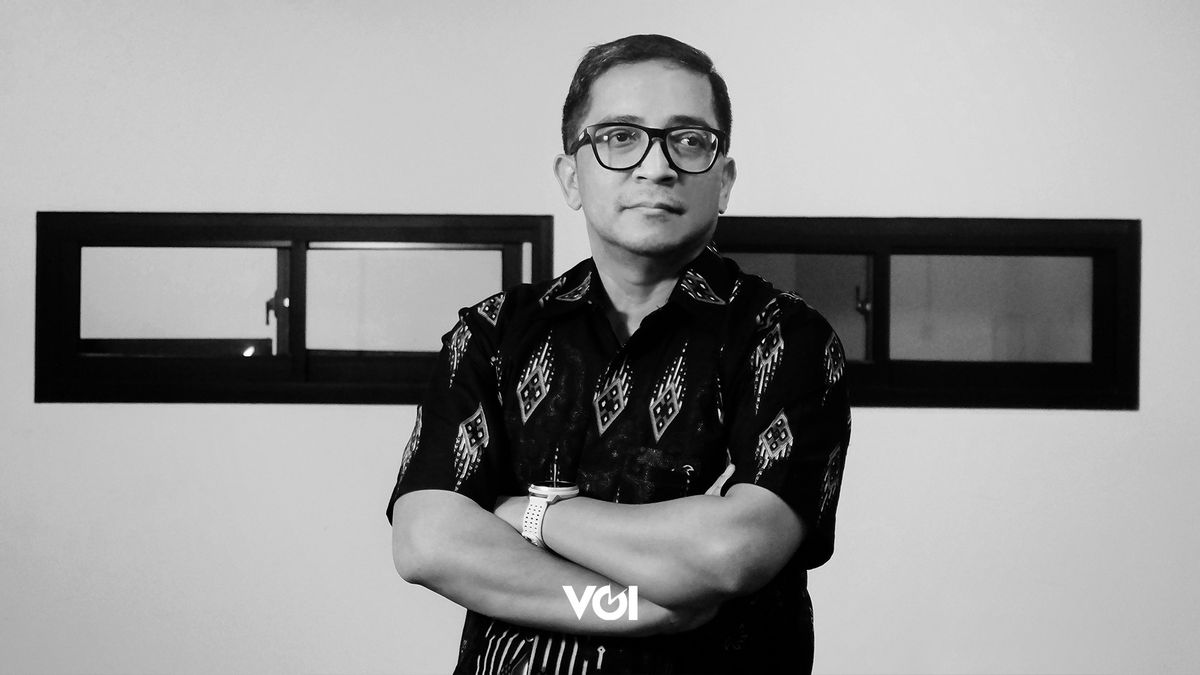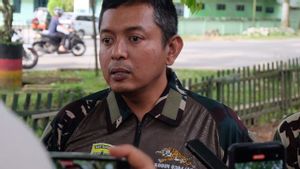The commotion over the different survey results from several survey institutions ahead of the 2024 Regional Election in Jakarta has raised questions. According to the General Chairperson of the Indonesian Public Opinion Survey Association (Persepi), Philips Jusario Vermonte, many have asked whether the survey results can be ordered according to the customer's wishes. Here's the explanation.
***
Ahead of the General Election or Regional Election, many survey institutions conduct polls to determine the electability of a political figure or political party. The results of this survey can be one of the considerations for prospective voters to determine their choice and channel their political aspirations. Therefore, survey results are important and often become the darling of politicians.
Since direct general elections were held in Indonesia, survey institutions have begun to develop. According to Vermonte, every voter's behavior can be used as a study to improve the situation, so that the results of the General Election or Legislative Election are better.
In the context of the Jakarta Regional Election, there were two different survey institutions that conducted polls with the same time period and location. However, the survey results were actually contradictory. The Indonesian Survey Institute (LSI) reported survey results that won the Pramono Anung - Rano Karno pair, while Poltracking Indonesia reported the victory of the Ridwan Kamil - Suswono pair. The question is: how can the survey results be different? Are the results deliberately made to win one of the candidate pairs?
This is where the opportunity for "coquetry" can occur. A politician may want positive survey results to lead prospective constituents who have not yet made a choice. Meanwhile, political survey institutions can get survey projects ordered by politicians.
However, according to Philips Jusario Vermonte, survey institutions must uphold credibility so that their survey results can be trusted. "I am often asked whether survey results can be ordered. Before conducting a survey, there must be an agreement between the survey institution and the politician or the party financing the survey. That the survey results cannot be intervened," he said.
In fact, Vermonte continued, whatever the survey results are, they need to be responded to wisely. "From the survey results, the existing reality is depicted. Therefore, don't give up even though the survey results are not good. Remember when Mr. Susilo Bambang Yudhoyono ran for President, initially his survey lost. However, he improved himself based on the survey, and finally won," he said to Edy Suherli, Bambang Eros, Irfan Meidianto, and Dandi Juniar when visiting the VOI office recently. Here is the full interview excerpt.

What specific violations did the Poltracking Indonesia survey institute commit that resulted in ethical sanctions from Persepi?
In Indonesia, surveys related to voter behavior are relatively new, especially since the era of direct presidential elections in 2004. Why did surveys grow and develop in the context of direct elections? Because the voice of each individual is important to know, not only for candidate pairs, but also for political parties. Surveys help evaluate whether the campaign has reached each individual, as well as identify any shortcomings.
Then, how do you find out people's preferences without having to interview everyone? In statistics, there is the term sampling. With statistical mathematical methods, sampling is expected to be able to represent the population.
As an illustration: when someone is sick, the doctor only takes a few milliliters of blood to check the patient's condition. From the blood sample, the doctor can diagnose the disease. Another example: Minang people, before the rendang is cooked, taste a little using the tip of a spoon to ensure the taste of the dish. That is also an example of the use of samples.
What about the differences in survey results?
Differences in survey results are actually normal as long as the survey is conducted with strict methodology, solid survey management, and correct analysis of the final results. Surveys are dynamic; if conducted at different times, the results could also be different.
However, the case that prompted Persepi to hold an Ethics Council hearing was the striking difference in survey results, even though they were conducted at the same time (October 10-17, 2024) and in the same area (Jakarta), and using similar methodology. Statistically, the results should not be much different. But in reality, the results of the Poltracking Indonesia and the Indonesian Survey Institute (LSI) surveys were very different, triggering public questions.
What were the findings of the Ethics Council hearing?
In this case, the Ethics Council summoned both survey institutions and asked them to send original data, questionnaires, and data collection methods. What is released to the public is usually the final result or conclusion, so raw data is very important for investigations.
Poltracking Indonesia claims to have conducted a survey of 2,000 respondents, but only 1,652 were valid. The problem is, many of the answers from the 1,652 respondents were blank or incomplete. When the Ethics Council asked, "Which was analyzed, data from 2,000 respondents or 1,652 respondents?" The Poltracking team's response was inconsistent.
Then?
When asked to submit raw data from 2,000 respondents, they stated that the data had been deleted. In fact, according to Persepi, survey data must be stored at least until the Pilkada is over.
The request for a written explanation from the Ethics Council was also not answered adequately. When called again, they still could not submit the data. Oddly, when the Ethics Council was about to announce the results of the investigation, Poltracking suddenly sent a WhatsApp message stating that they had rediscovered the data that was previously claimed to be lost.

What's in it?
It turns out that the data sent by Poltracking is complete and there are no more gaps. In fact, previously, out of 1,652 respondents, many answers were blank. Based on this data, we have drawn conclusions about the survey that was conducted.
However, from the two data sent — first, data from 1,652 respondents, and second, data from 2,000 respondents — both could not be verified. Finally, we made a decision and imposed sanctions.
What sanctions were given to Poltracking Indonesia?
Yes, after going through the process, Persepi decided that Poltracking Indonesia could not immediately release the results of its survey to the public. Their survey results must first be verified by Persepi.
We pay close attention to the survey results and ensure that there are no errors in survey management. In this case, serious errors in survey management were indeed found.
How do you respond to Poltracking rejecting sanctions and choosing to leave Persepi?
No problem. What we decide is the organization's decision. Before imposing sanctions, we have presented the results of the investigation, including recordings of conversations with Poltracking friends.
When the decision was made, we also invited them. However, perhaps because they were busy, they did not attend. Our focus was on maintaining the credibility of the organization and public trust in the survey results.
Have there been any other survey institutions that have been sanctioned by Persepi?
Yes. In the 2014 Presidential Election quick count process, we fired three survey institutions. At that time, there were 10 institutions that conducted surveys. Seven institutions stated that Jokowi won, while the other three stated otherwise.
We then conducted an audit of all of these institutions. Seven institutions were present to provide explanations, while the other three were absent. Finally, Persepi decided to fire the three institutions that were absent.
What does Persepi do to improve the quality of its members?
In addition to enforcing discipline through sanctions, we also routinely hold survey methodology training every year. The goal is to maintain the quality of our members' surveys.
We once invited Christina Prather, an expert from George Washington University, to give a lecture to our members. Christina has experience conducting surveys in sensitive areas, such as Palestine and Iraq.
In Indonesia, we also face challenges related to sensitive issues of identity politics and religion. This is not easy because respondents may answer dishonestly due to social pressure or discomfort.
Some say survey results can be ordered, is that true?
Yes, I often get questions like that. I always explain that surveys are expensive. Usually there is a party that provides funds for the implementation of the survey. For example, there are people who request an electability survey when they are going to run for regional or legislative elections. Can the survey results be ordered?
There are several scenarios that might occur. For example, there is an agreement before the survey is conducted. The first agreement is that the survey results cannot be intervened. Then, if the survey results show low electability, it is possible that the party requesting the survey chooses not to publish it and only uses it for internal policies. All of this depends on the integrity of the survey institution concerned.
The important thing that I emphasize is data transparency. As much as possible, survey institutions should release raw data. This will not only increase public trust but also support the development of social sciences. In countries such as Europe and America, social research is growing rapidly because of the availability of data. The data is open to the public, not simply deleted.
How does Persepi maintain transparency?
At Persepi, there is an agreement that each survey institution must upload at least one raw research data every year, after going through an embargo period. This embargo gives survey institutions time to utilize the data first, for example to write reports or scientific publications. With this, the data can be used as research and analysis material by other parties, thus ensuring that survey institutions cannot be "ordered".
What lessons can be learned from the Poltracking Indonesia case?
I have conveyed to the members, first we must complete the rules. Data surveyed about legislative elections, presidential elections, etc., data must be stored for a certain period. It cannot be deleted immediately for any reason. At least if the regional elections have not been completed, the survey data about the regional elections should not be deleted first. Second, we must continue to conduct regular methodology training. Including survey management, how to improve survey quality, close the gap of non-sampling error.
Third, we convey to the public, how to understand surveys. For politicians, if the results of a survey institution are superior, they will say that the survey institution is credible, and vice versa. Whatever the results, use the survey results for evaluation. Because the survey results depict the existing reality. So don't give up even though the survey results are inferior. Remember when Mr. Susilo Bambang Yudhoyono ran for president, initially he lost in the survey. However, he improved himself based on the survey. And finally he won.
Are surveys still needed in the future?
In my opinion, yes. So far we have been too focused on electability surveys. In fact, surveys can also be used for many other things, such as measuring the level of public satisfaction with local government services, or finding out public perception of certain policies. Surveys are a very useful tool for evaluating public policies and seeing how the public responds to them.
Behind Philips Jusario Vermonte's Vinyl Collection

Enjoying the work of musicians through vinyl records has a deep meaning and philosophy for Philips Jusario Vermonte. (Photo: Bambang Eros, DI: Raga Granada VOI)
Nowadays, enjoying music is very easy. Just choose an online music service, and in an instant the song you want will be served. Very different from enjoying music through vinyl records, which requires time and a conducive situation. Complicated, indeed, but that's what Philips Jusario Vermonte does when taking a break from his busy schedule as a lecturer, researcher, General Chair of the Indonesian Public Opinion Survey Association (Persepi), and now as a spokesperson for the Indonesian Presidential Communications Office.
Philips has a long and philosophical reason why he chose something unusual for the current generation in enjoying music. "I do like collecting vinyl records. Listening to vinyl records requires dedicating time, it can't be arranged like the CD tracks that exist today. It has to be in order from the first song to the last," said the man who now serves as Dean of the Faculty of Social Sciences at the International Islamic University of Indonesia (UIII).
Philips likens the arrangement of songs on vinyl records to the order in a novel. "After the first song is finished, we prepare for the second song and so on until the record is finished playing on the gramophone," said Philips, who considers records as art artifacts.
In addition to the music that is the main attraction, the large record packaging also attracts his attention. "Usually the cover is artistic. It states the contents of the record, the background, and the process of making the album, as well as other things related to the music presented. People who listen to music in cyberspace don't find that side; they just listen to the music," explained the senior researcher from CSIS.
Philips collects all genres of music available in the form of records. "I have all genres. From collecting records, I have become more amazed and respectful of musicians. They are geniuses who are able to bewitch the masses to like their work," he praised.
Live Concert at Prison

Philips Jusario Vermonte found many things behind the vinyl record wrapper. (Photo: Bambang Eros, DI: Raga Granada VOI)
There is one story that really impressed Philips, which he found on a vinyl record: a live concert by blues musician B.B. King at Cook County Jail, Illinois, United States, in the 1970s. "The back cover of the vinyl record tells how the concert took place. It reflects the changes and reforms in prisons in the United States. The warden believed that music could be an entry point for someone to change. He invited B.B. King, and it turned out that King agreed," said the Minang man born in Manila, July 14, 1972.
At that time, B.B. King set a condition: during the concert, there should be no barriers between him and the inmates. "Initially, the warden was worried because the prison was inhabited by various types of inmates. However, it turned out that the concert went safely and the recording was extraordinary. Many inmates were moved to tears, as were B.B. King and the warden," he said.
According to Philips Jusario Vermonte, the concert in the prison truly humanized the inmates. "The story behind the process would not be found if you only listened to the music from online music services," he explained. That is the philosophical reason why he really likes music recorded on vinyl.
The Meaning of a Name

Having a unique name, makes Philips Jusario Vermonte receive parcels for two holidays; Eid and Christmas. (Photo: Bambang Eros, DI: Raga Granada VOI)
William Shakespeare may have belittled the meaning of a name, but for many people, names have deep meaning and purpose. So too with the name Philips Jusario Vermonte, which sounds very Western.
Philips said that after the PRRI/Permesta rebellion in Sumatra was crushed by Soekarno and the TNI, concerns arose among the Minang people that their children would have difficulty pursuing careers in government if they continued to use typical Minang names. "Because of that, Minang parents often give names that sound Western. If you stick with typical Minang names, it's difficult to become a civil servant," he said.
"At CSIS, I have a friend named Aria Fernandez. His name sounds like Spanish, Portuguese, or Latin, even though he's Minang," he continued.
Meanwhile, the history of the name Vermonte is simple. "When my mother was pregnant, she accompanied my father who was on duty in Manila. I was born at the Vermont Maternity Clinic. So, my parents took the name 'Vermont' and added the letter 'e'. It became Vermonte," he said.
This unique name makes Philips often receive parcels on two holidays at once. "Many people know that I am Muslim, but many also think that I celebrate Christmas. So, I get parcels on Eid and Christmas, hehehe," he said with a smile.
Behind the uniqueness of his name, there is a great wisdom for Philips Jusario Vermonte. "This name allows me to enter various groups, especially for those who are still constrained by name stereotypes. I can bridge that," he said.
"Whatever the result, make the survey result for evaluation. Because the survey result depicts the existing reality. Don't give up even though the survey result is defeated,"
The English, Chinese, Japanese, Arabic, and French versions are automatically generated by the AI. So there may still be inaccuracies in translating, please always see Indonesian as our main language. (system supported by DigitalSiber.id)










